Introduction
Generative AI refers to AI systems that can create new content, insights or designs based on parameters and examples provided by humans.
As per recent reports, investments in generative AI are predicted to grow 100x in the next 6 years, from $12 billion currently to over $1.2 trillion by 2028 (Asgard.vc & Creative Destruction Lab, 2022).
This enormous growth potential highlights the transformative impacts generative AI can drive across sectors. Use cases span content generation, data analysis, process automation, personalized recommendations and more.
Specifically, the drug discovery sector estimates over $70 billion in cost savings from leveraging generative AI over the next decade (BCG, 2021). Generative design in manufacturing could similarly yield over $325 billion in annual savings by 2030 per World Economic Forum estimates (WEF, 2021).
With cloud infrastructure expanding access and usability, all sectors stand to gain immense efficiency, personalization and innovation through diverse generative AI applications.
This article explores the revolutionary potential of leading generative AI use cases across major industries.
How Generative AI Works?
Generative AI employs a range of techniques such as Generative Adversarial Networks (GANs), Variational Autoencoders (VAEs), and Recurrent Neural Networks (RNNs).
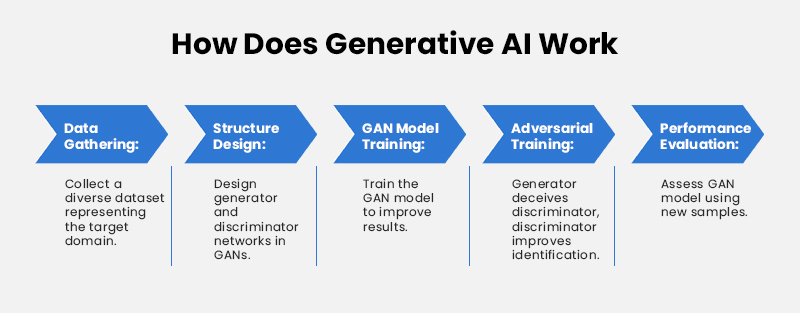
These algorithms allow machines to generate new content based on patterns and examples provided during training.
Explanation of the Training Process
During training, generative AI models learn from vast amounts of data, extracting underlying patterns and structures.
By analyzing and understanding the data, the models gain the ability to generate new, original content that closely resembles the training samples.
Importance of Data Quality and Quantity
The quality and quantity of data play a crucial role in the effectiveness of generative AI.
Large, diverse datasets provide a broader range of examples for the model to learn from, enabling it to generate more accurate and creative outputs.
Clean and well-labeled data further enhances the model's ability to generate meaningful and reliable results.
Generative AI Use Cases in Industries
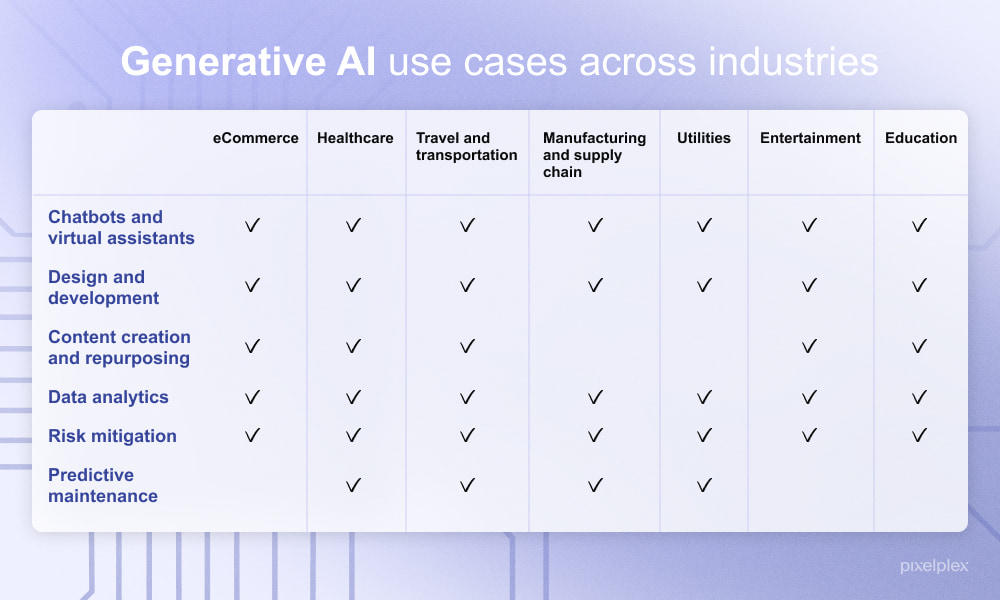
Generative AI is making waves across various industries, bringing about transformative changes and unlocking new possibilities. Let's explore some remarkable generative AI use cases:
Healthcare
Here are the generative AI use cases in healthcare sector:
Enhancing medical imaging analysis
Generative AI is revolutionizing medical imaging analysis by accurately detecting anomalies. It also aids in the early diagnosis of diseases, and assisting doctors in making informed decisions.
AI-powered algorithms can analyze medical images like X-rays, MRIs, and CT scans. Thus helping identify potential issues that might have been missed by human eyes alone.
Drug discovery and development
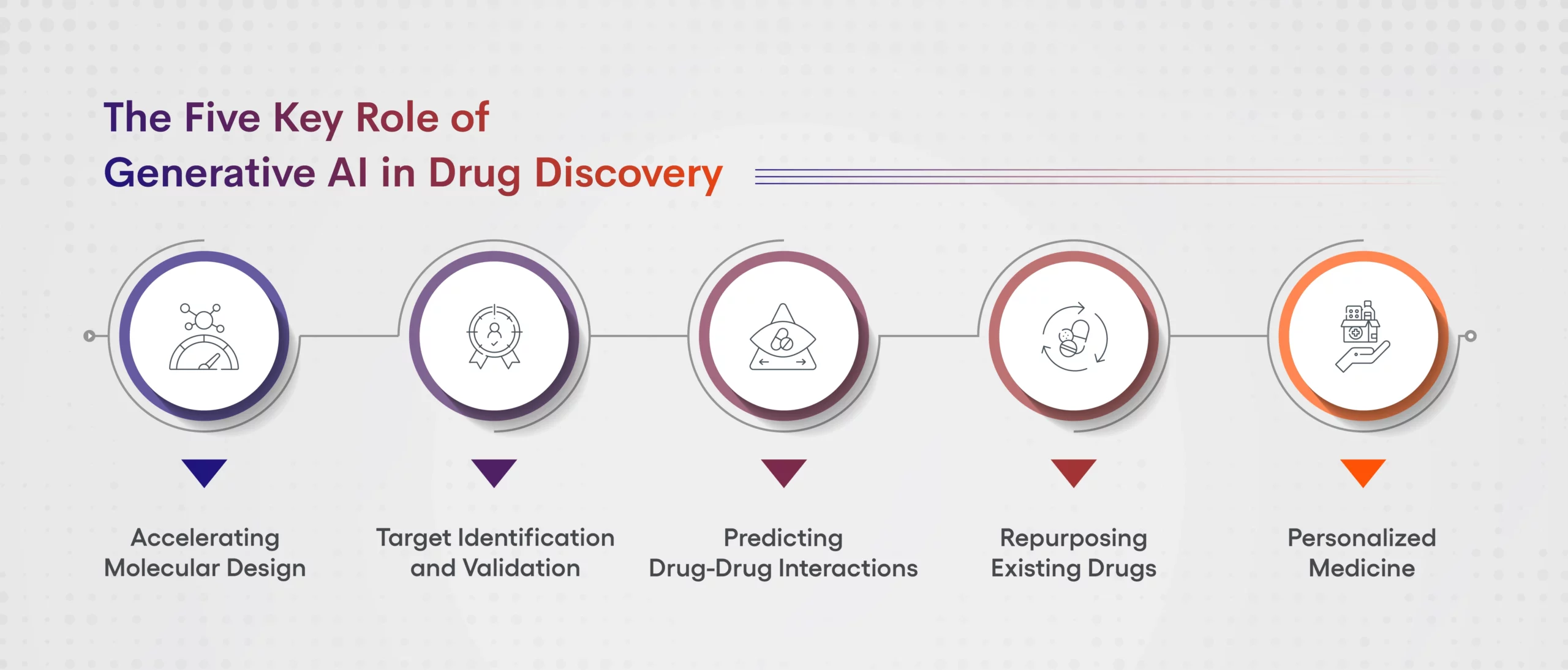
In pharmaceuticals, generative AI is accelerating drug discovery and development processes.
By analyzing vast amounts of chemical and biological data, AI models can predict molecular properties, design new compounds, and optimize drug candidates. This saves time, reduces costs, and enables the discovery of novel therapies.
Manufacturing
In manufacturing section, these are the uses:
- Optimizing production processes: Generative AI is streamlining manufacturing operations by optimizing production processes.
AI models can analyze production data, identify inefficiencies, and recommend improvements.
- Designing and prototyping: Generative AI is transforming product design and prototyping by generating new design concepts based on specified parameters.
It enables designers to explore a vast design space quickly, iterate on ideas, and create innovative products that align with user needs.
Finance
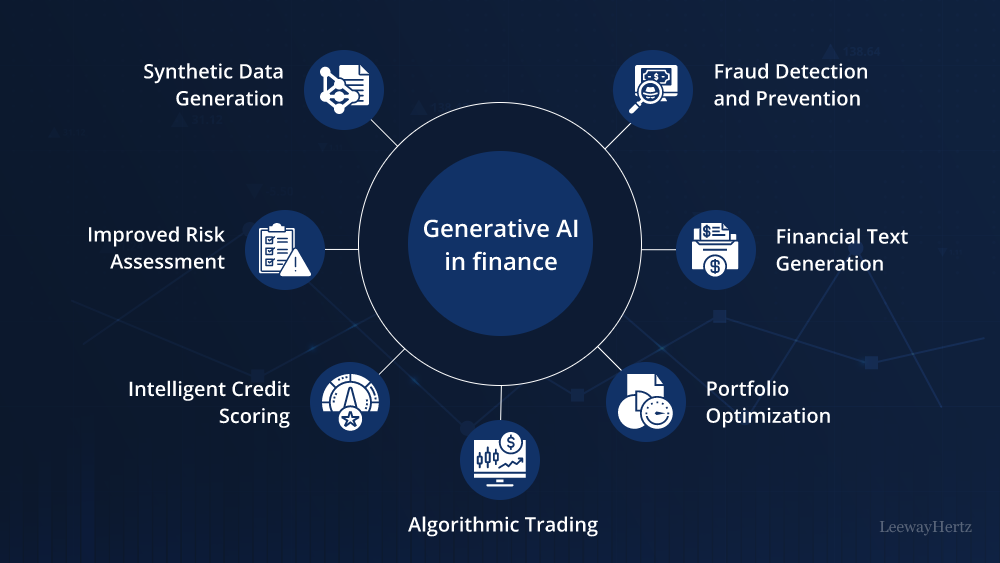
Finance use generative AI for:
Fraud detection and prevention
One of the best Generative AI use cases is that it can play a pivotal role in the finance sector by detecting and preventing fraudulent activities.
AI algorithms can analyze vast volumes of financial data, identify patterns of fraudulent behavior, and flag suspicious transactions in real time. This helps in minimizing financial losses and protecting consumers.
Automated trading strategies
Generative AI is revolutionizing financial markets by developing automated trading strategies.
AI models can analyze market trends, historical data, and news articles to predict stock price movements and make informed trading decisions. This leads to increased efficiency and improved investment outcomes.
Creative Industries
Here are the generative AI use cases in creative sector:
Music composition and generation
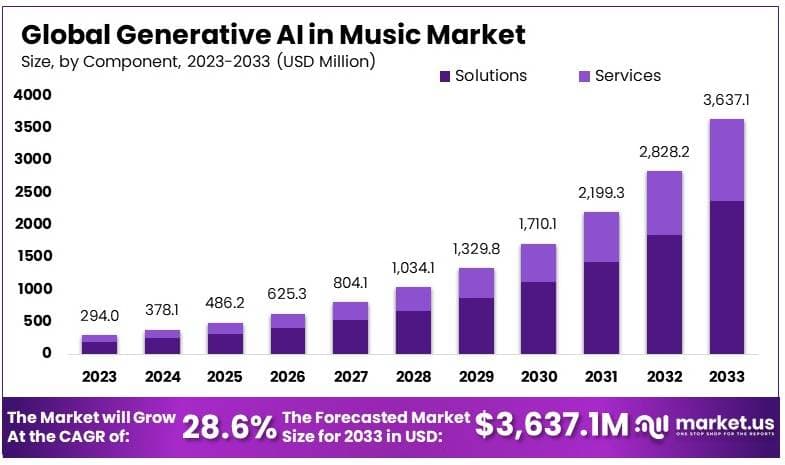
Generative AI is pushing the boundaries of music composition and generation.
AI models can analyze vast music libraries, learn musical patterns, and generate original compositions based on various styles and genres. This sparks creativity and offers new possibilities for musicians and composers.
Visual arts and design
AI algorithms can generate stunning visuals, create realistic 3D models, and assist artists in generating novel concepts.
This collaboration between human creativity and AI capabilities leads to extraordinary and visually captivating creations.
Customer Service
And, in customer service sector, these are the generative AI uses:
Chatbots and virtual assistants
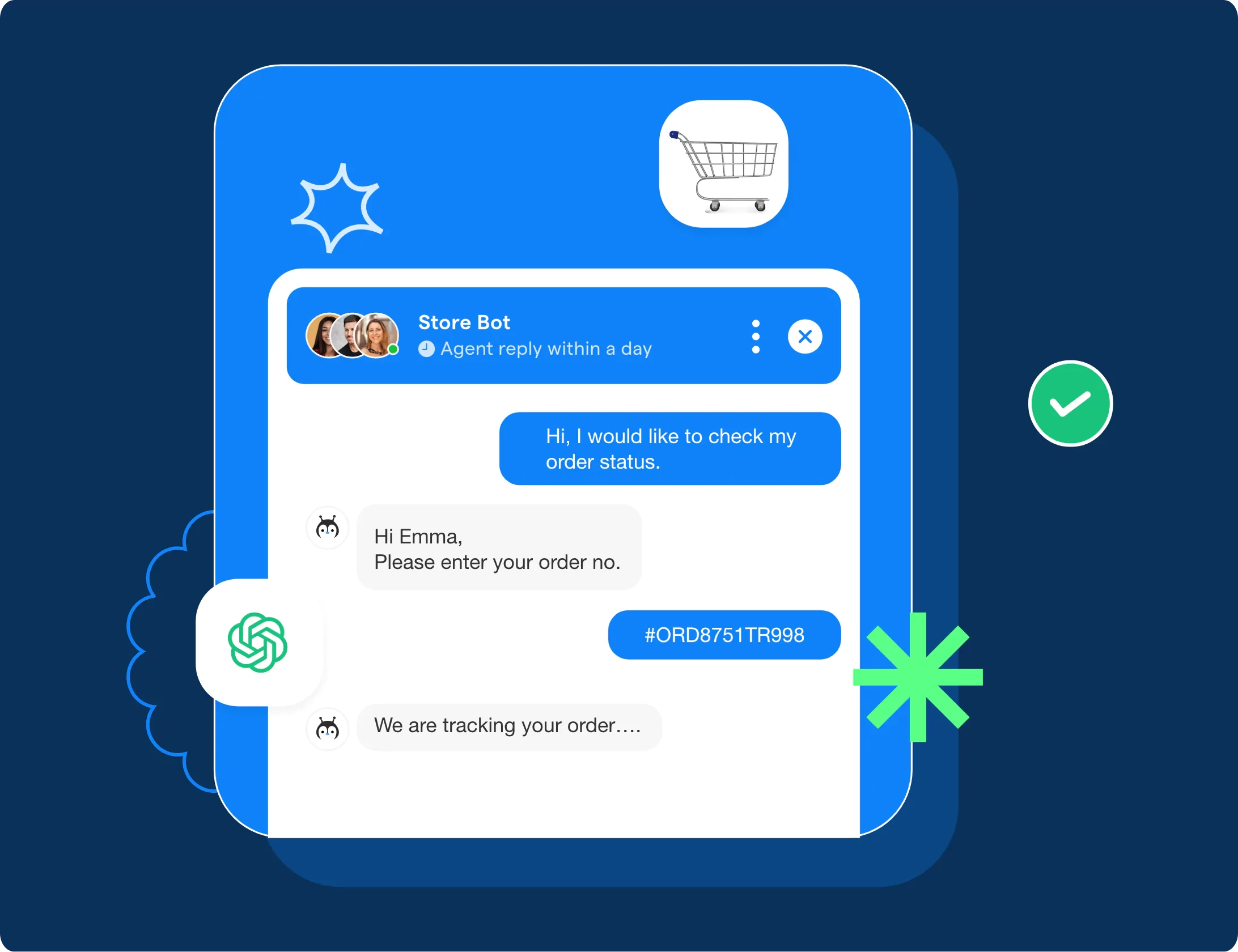
Generative AI is revolutionizing customer service with the development of intelligent chatbots and virtual assistants.
These AI-powered conversational agents can understand and respond to customer queries, provide personalized recommendations, and enhance customer experiences, all while reducing the load on human support teams.
Personalized recommendations
Generative AI enables personalized recommendations in various industries such as e-commerce and entertainment.
By analyzing user preferences, purchase history, and behavior patterns, AI models can suggest products, movies, music, and content tailored to individual tastes. It leads to improved user satisfaction and engagement.
Benefits of Generative AI in Industries

Given below are the benefits of generative AI in industries:
Increased Efficiency and Productivity
Generative AI is a game-changer when it comes to boosting efficiency and productivity in various industries.
Automating repetitive tasks and augmenting human capabilities, frees up valuable time and resources.
For instance, in healthcare, generative AI algorithms can analyze medical images with incredible speed and accuracy. It enables doctors to make quicker and more accurate diagnoses.
This not only saves time but also improves patient outcomes by facilitating early detection and personalized treatment plans.
Suggested Reading:
How to Boost Your Creativity with Generative AI Models?
Enhanced Decision-Making Processes
In industries where decision-making plays a critical role, generative AI provides valuable insights and predictions that empower professionals to make informed choices.
In finance, AI-powered algorithms analyze vast amounts of data to identify patterns and trends, enabling financial institutions to make strategic investment decisions and manage risk effectively.
Similarly, in manufacturing, generative AI algorithms optimize production processes by analyzing real-time data. It ensures timely decision-making and minimizes downtime.
Cost Savings and Resource Optimization
Generative AI has the potential to generate significant cost savings and optimize resource allocation across industries. It can streamline processes and reduce human error, minimizes waste and maximizes efficiency.
In supply chain management, generative AI algorithms can optimize inventory levels, route planning, and demand forecasting. It led to reduced costs and improved customer satisfaction.
Moreover, in energy management, AI-based systems can optimize energy consumption patterns. This resulted in substantial cost savings and a reduced environmental footprint.
Challenges and Ethical Considerations of Generative AI
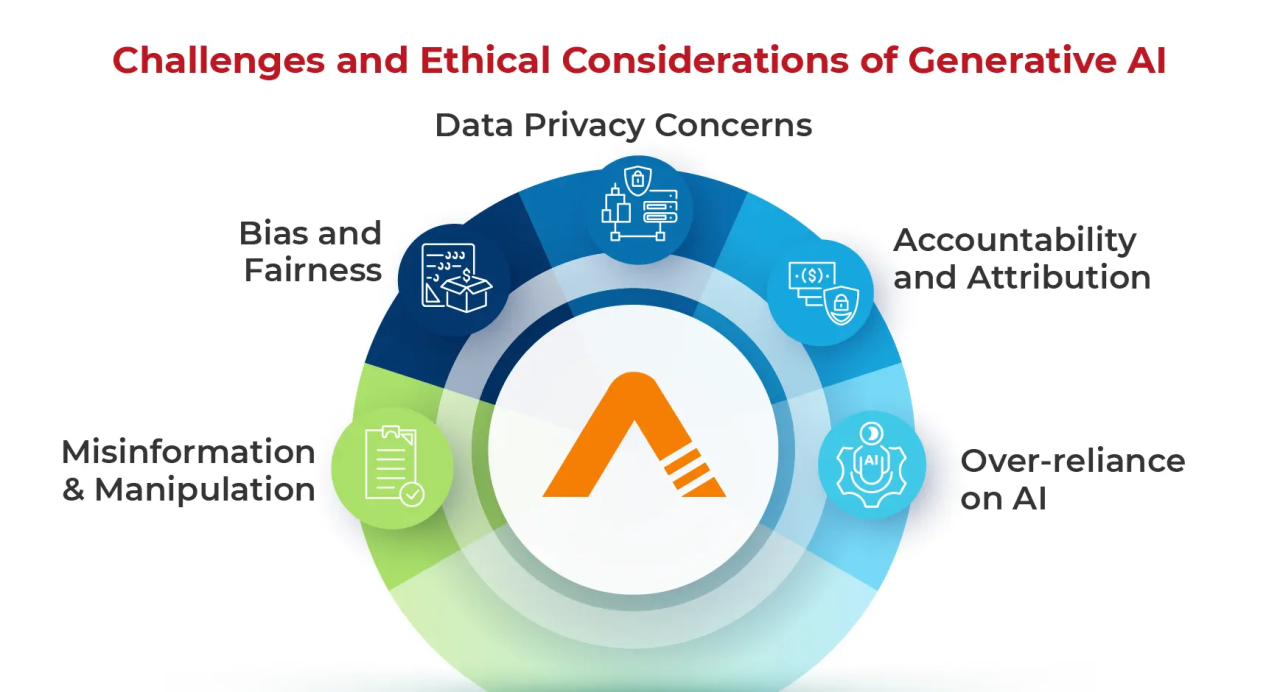
Given below are the challenges and ethical considerations of generative AI:
Data Privacy and Security
As generative AI relies on vast amounts of data, ensuring data privacy and security becomes paramount.
Safeguarding sensitive information and maintaining ethical data practices are essential to building trust and preventing unauthorized access or misuse of data.
Striking a balance between data utilization and privacy protection is crucial in the development and deployment of generative AI solutions.
Bias and Fairness Issues
Generative AI algorithms are only as unbiased as the data they are trained on. Biases present in training data can lead to biased outcomes and unfair decision-making.
It is crucial to identify and address biases to ensure fair and equitable outcomes. Transparency in algorithms and continuous monitoring is essential to mitigate bias and ensure fairness across different demographic groups.
Suggested Reading:
9 Ways to Use Generative AI to Boost Your Marketing Efforts
Legal and Regulatory Implications
The rapid advancements in generative AI technology raise complex legal and regulatory challenges.
Issues surrounding intellectual property rights, accountability, and liability need careful consideration. Legal frameworks must keep pace with technological advancements to ensure the responsible and ethical use of generative AI in industries.
Future Outlook and Emerging Trends of Generative AI
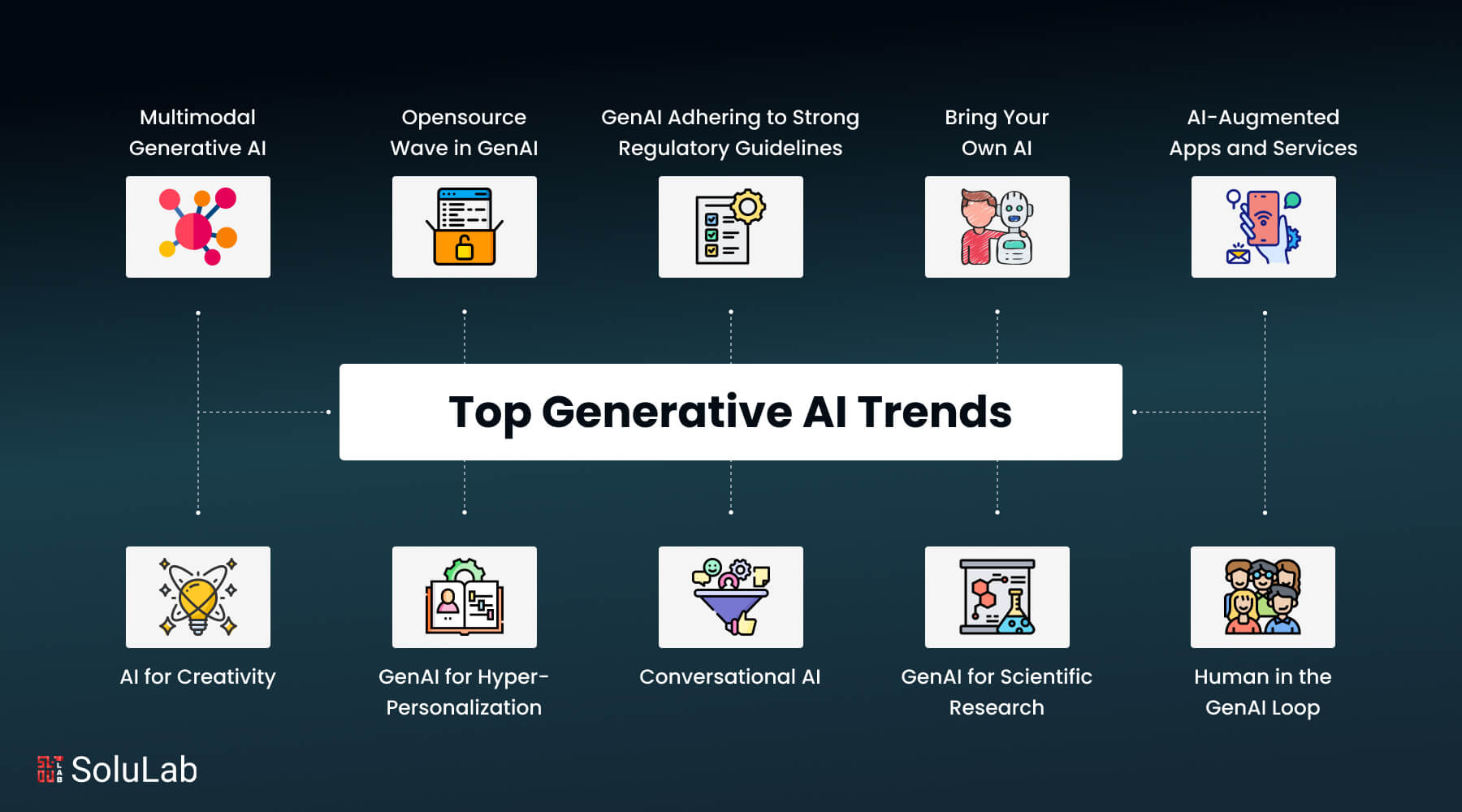
Here’s the future outlook and emerging trends of generative AI:
Advancements in Generative AI Technology
Generative AI is an evolving field with ongoing advancements. Researchers are continuously exploring new techniques and models to enhance the capabilities of generative AI.
From improving the quality and diversity of generated outputs to developing more efficient training methods, the future holds exciting possibilities for generative AI technology.
Suggested Reading:
How Generative AI models are used in building AI Chatbots
Potential Impact on Job Roles and Workforce
The rise of generative AI is expected to reshape job roles and the overall workforce landscape. While some routine tasks may be automated, new opportunities will arise for humans to focus on higher-level creative and strategic work.
Upskilling and adapting to the changing technological landscape will be essential for individuals and organizations to thrive in the era of generative AI.
Conclusion
In conclusion, generative AI is enabling breakthrough innovations across sectors by augmenting human creativity and productivity.
Recent projections estimate that by 2025, generative AI could add over $13 trillion to the global economy (PwC, 2021).
Advances in natural language processing continue to make generative models more powerful and accessible. As per McKinsey, basic conversational AI agents could handle nearly 80% of all customer queries by 2030 (McKinsey, 2021).
Solutions like BotPenguin allow businesses of all sizes to activate chatbots and text content generation with no coding needed.
With intuitive GUIs and ready templates, domain experts can now leverage AI to create online store product listings, blog posts and social media content in minutes.
Democratizing generative capabilities in this manner will prove vital for long-term economic growth.
As Accenture notes, pairing human talent with AI can drive a 40% boost in productivity (Accenture, 2021). By integrating generative models into existing workflows, solutions like BotPenguin empower professionals in every industry to unlock enhanced output and insights.
Overall, from automated visual design to accelerated drug discoveries and even personalized nutrition plans, the applications of generative AI know no bounds.
Frequently Asked Questions (FAQs)
How does Generative AI impact industries?
Generative AI transforms industries by automating complex tasks, creating realistic content, and enhancing decision-making processes.
From healthcare to finance, it revolutionizes workflows by generating innovative solutions and improving efficiency.
What are some key use cases of Generative AI in industries?
Generative AI finds application in diverse fields, including content creation, drug discovery, financial modeling, and design optimization.
It generates realistic images, text, and even contributes to scientific breakthroughs by exploring vast solution spaces.
How does Generative AI contribute to creativity and innovation?
By leveraging Generative AI, industries can enhance creative processes through automated idea generation, design iteration, and content creation.
This technology fosters innovation by providing new perspectives and solutions that may not be apparent through traditional methods.
What challenges and considerations come with implementing Generative AI in industries?
Implementing Generative AI involves addressing ethical concerns, data privacy issues, and the need for robust governance.
Balancing the power of automation with responsible usage is crucial to harnessing the full potential of Generative AI across industries.


